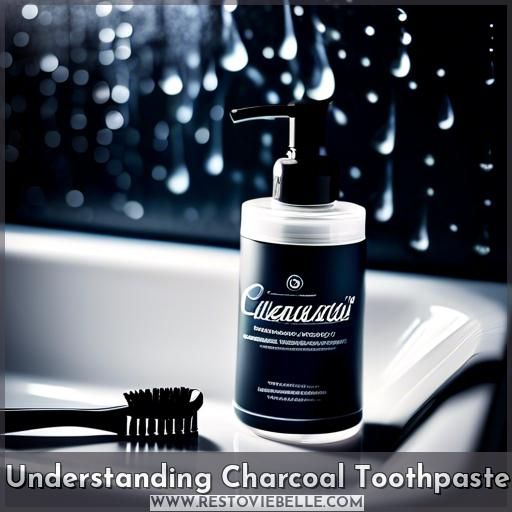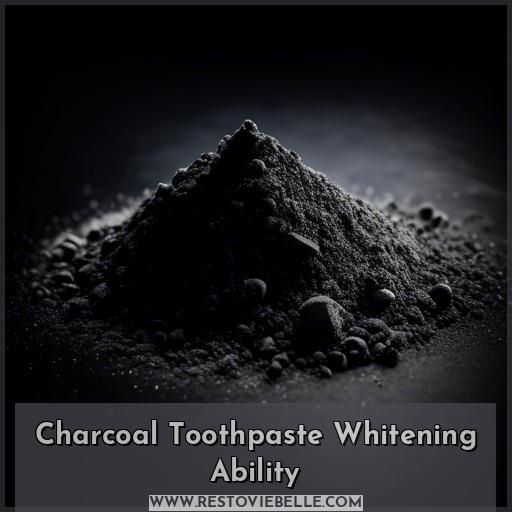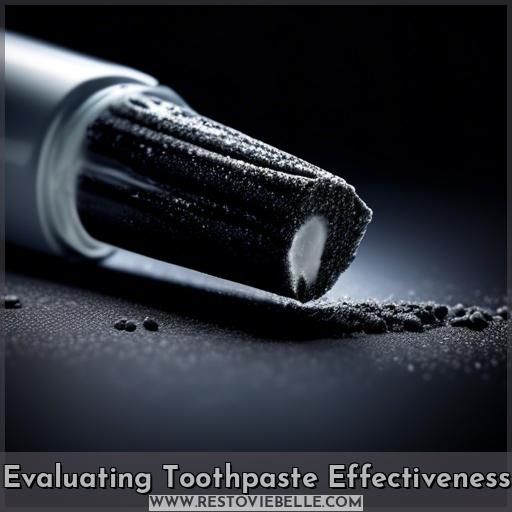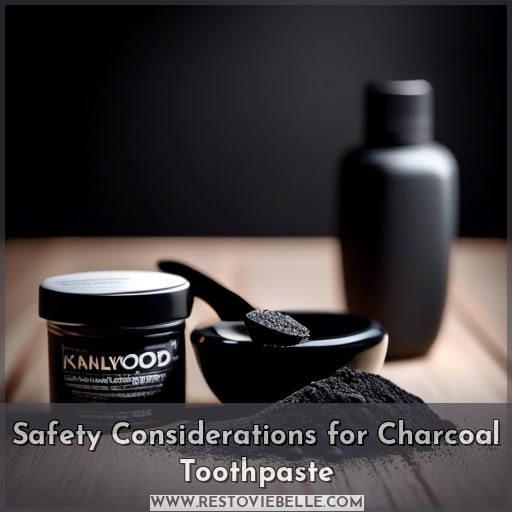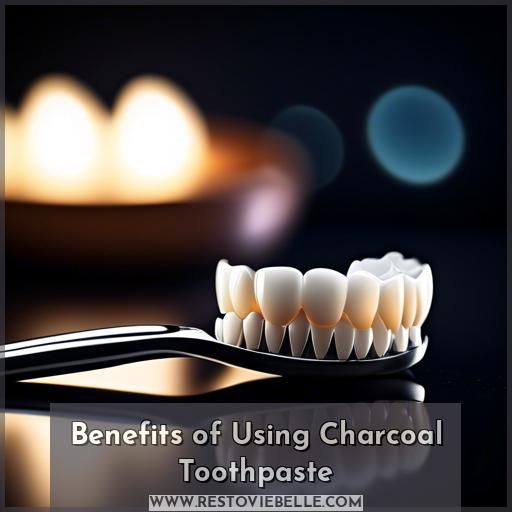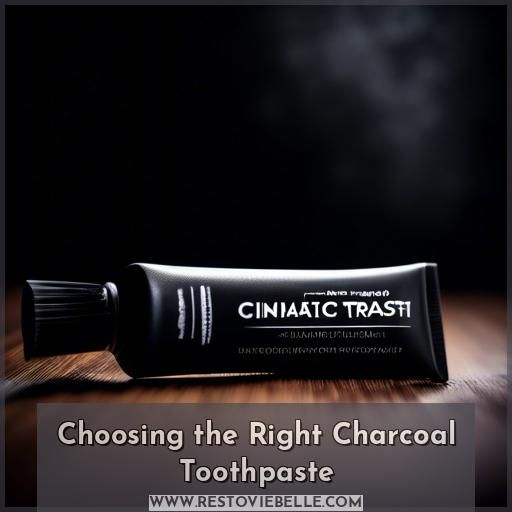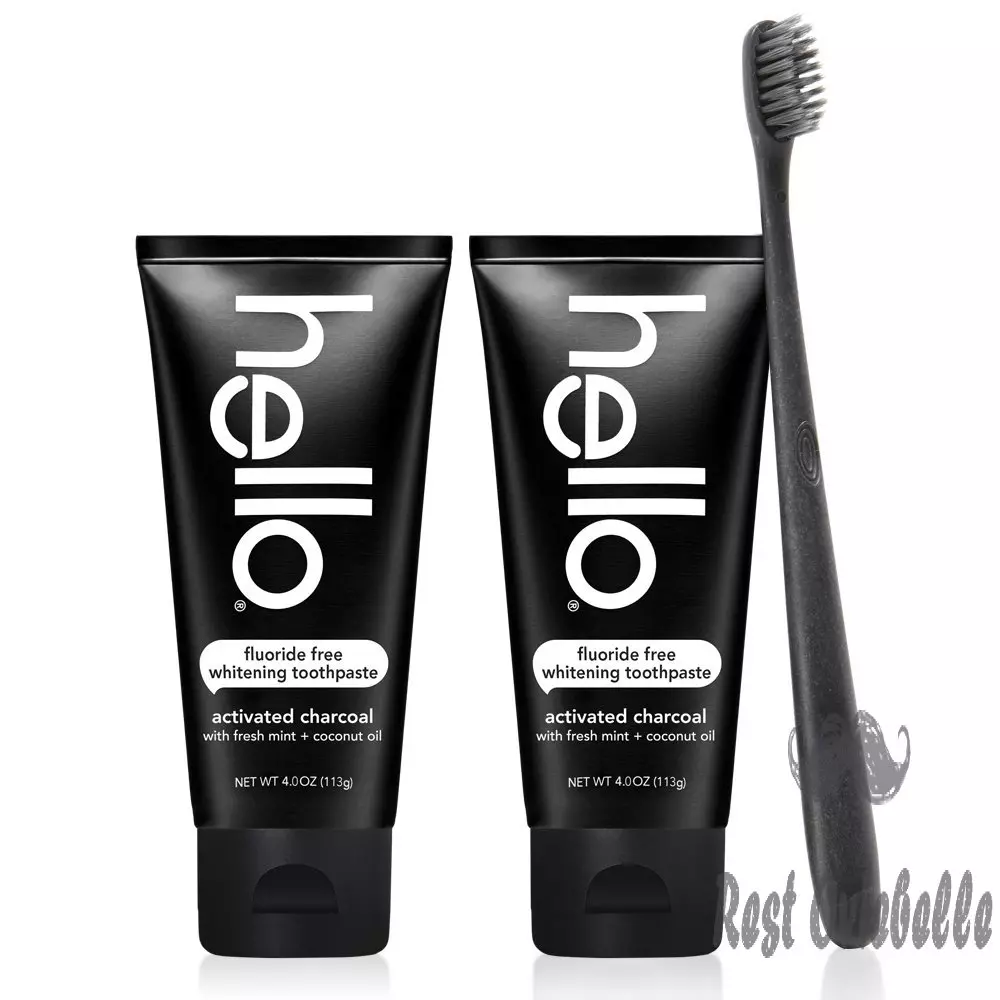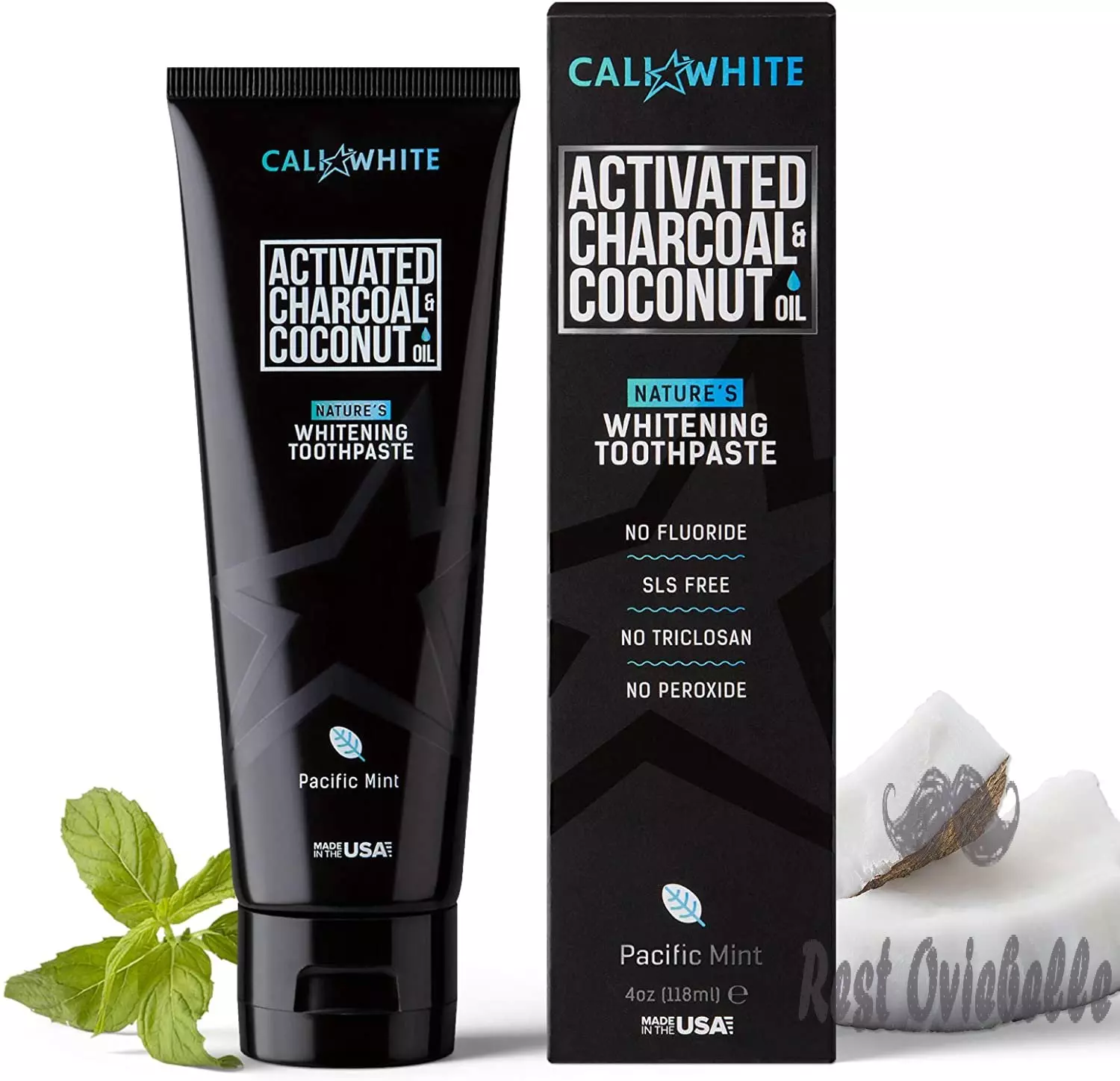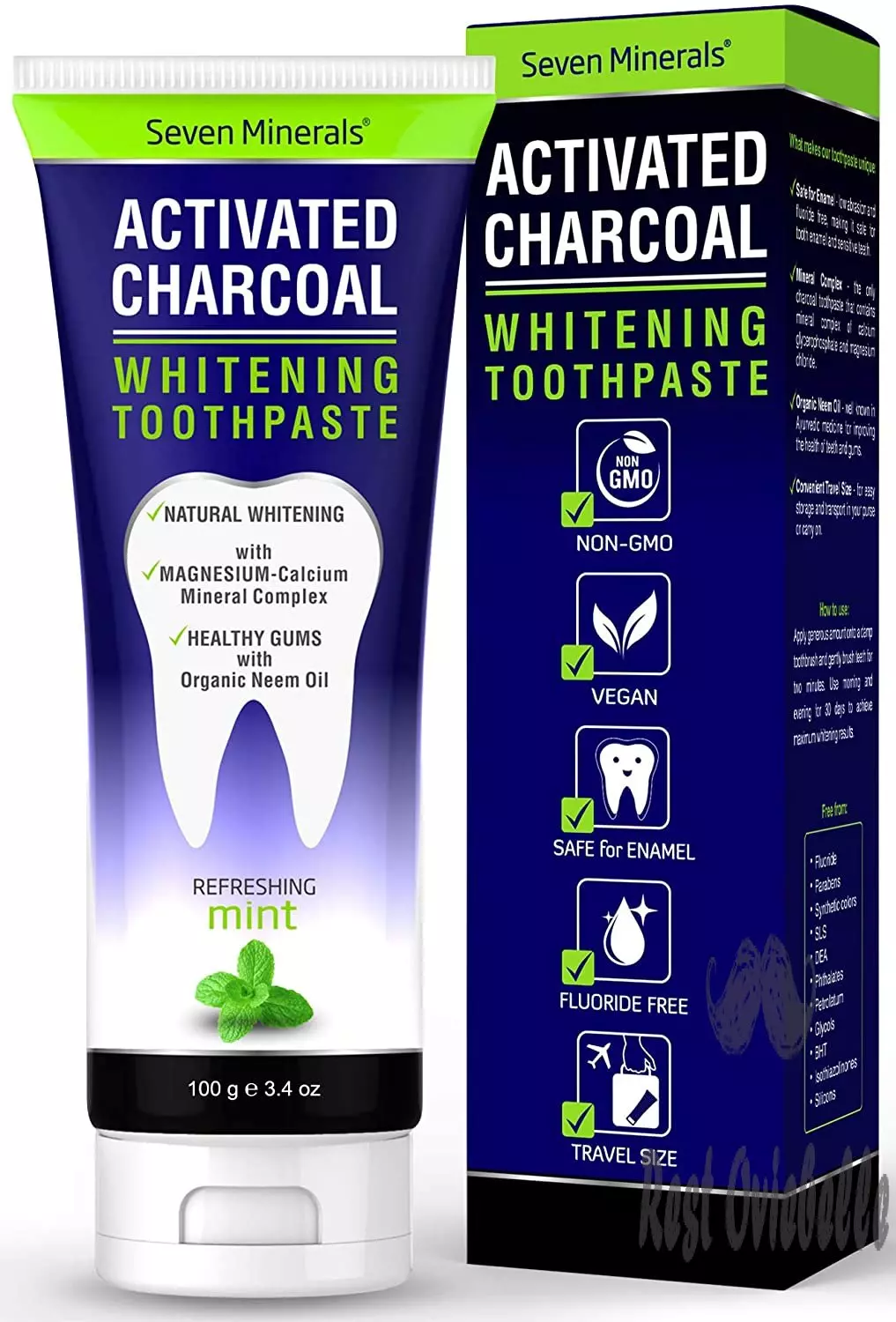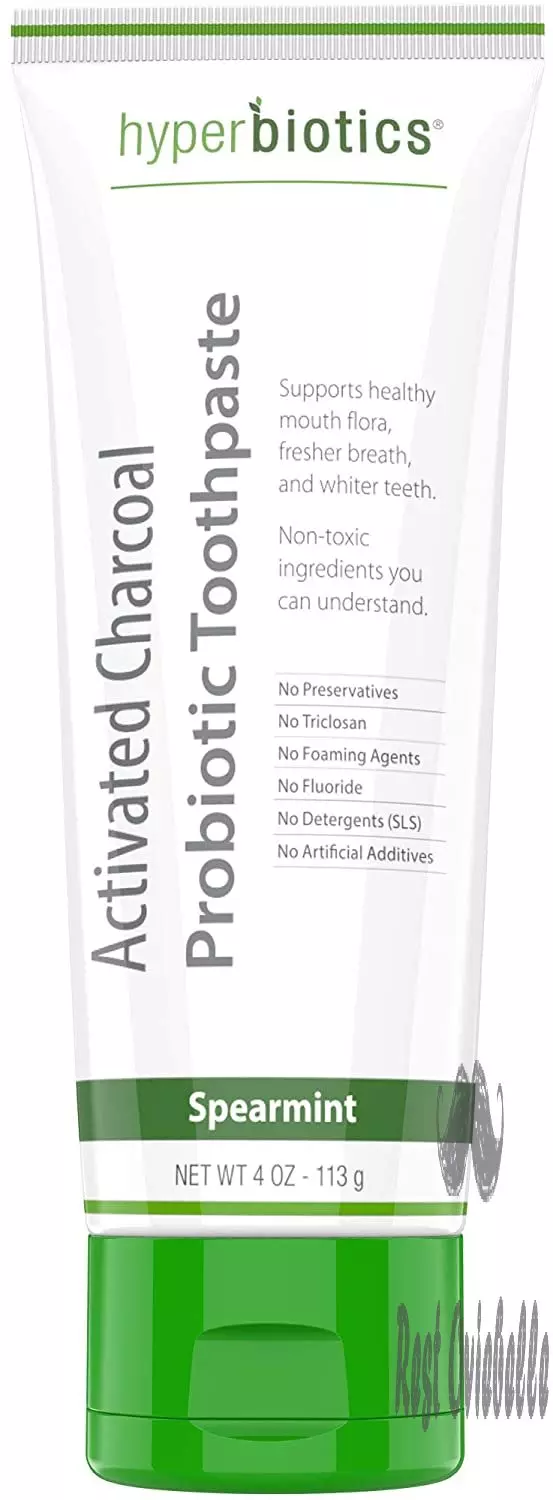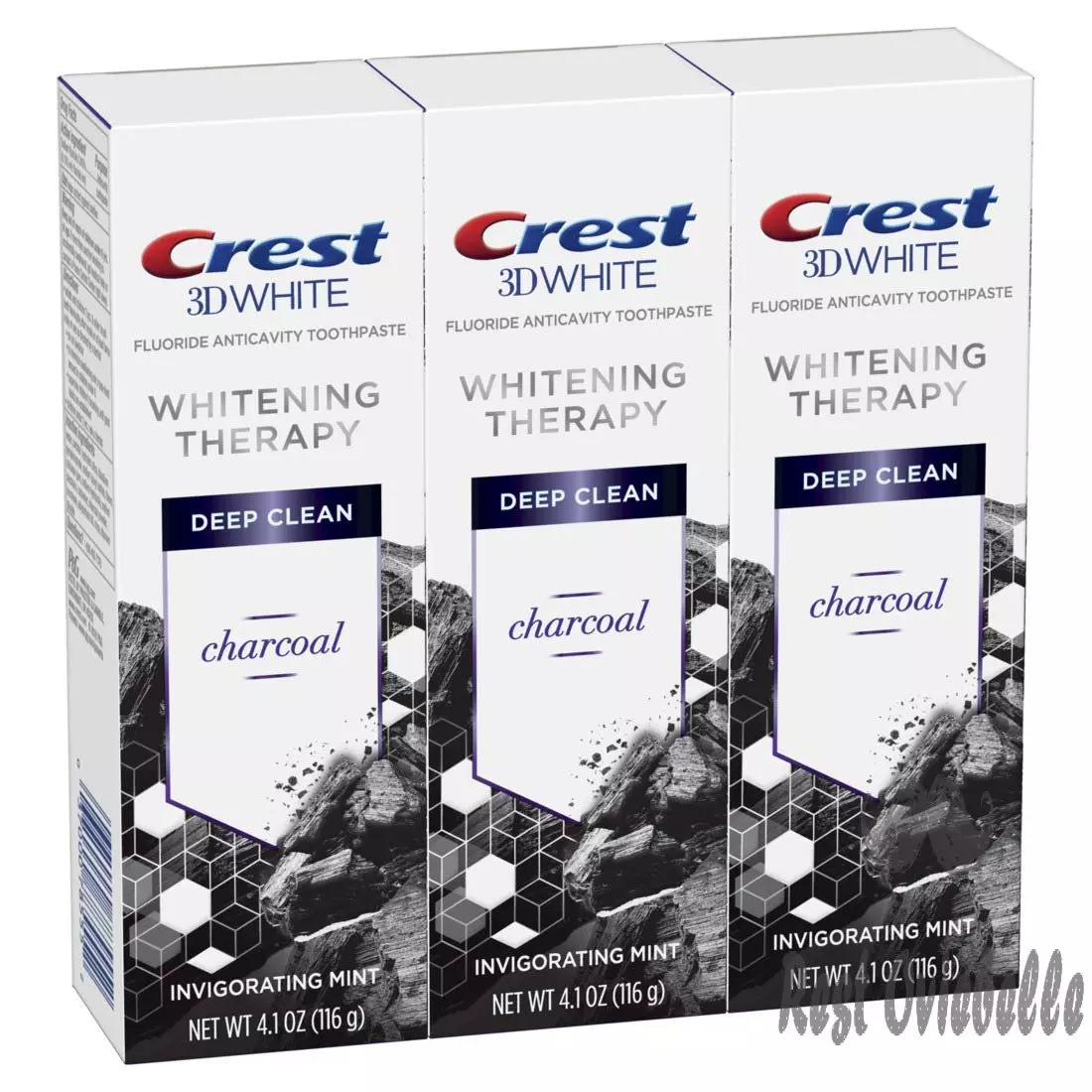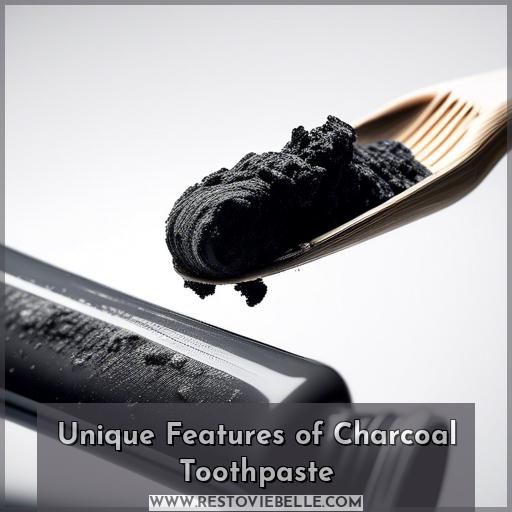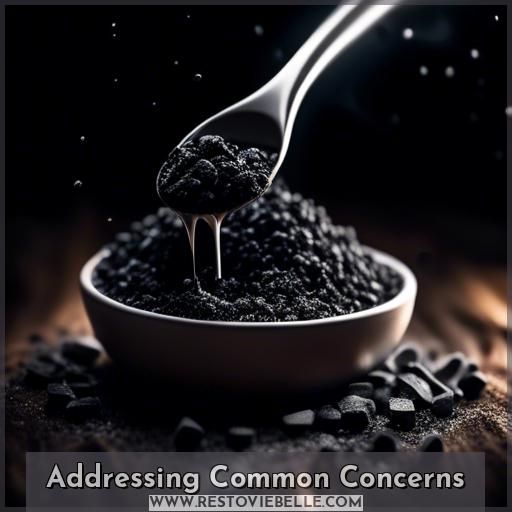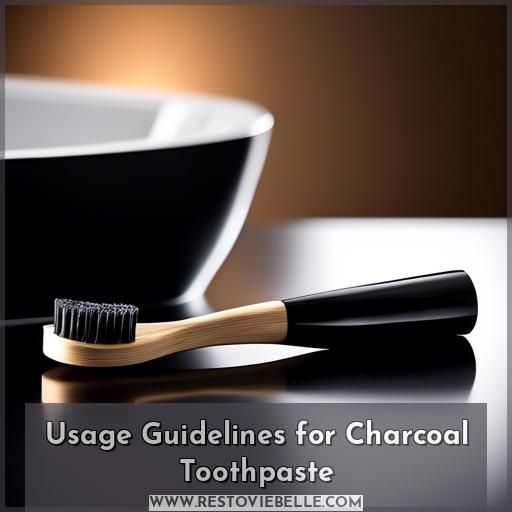This site is supported by our readers. We may earn a commission, at no cost to you, if you purchase through links.
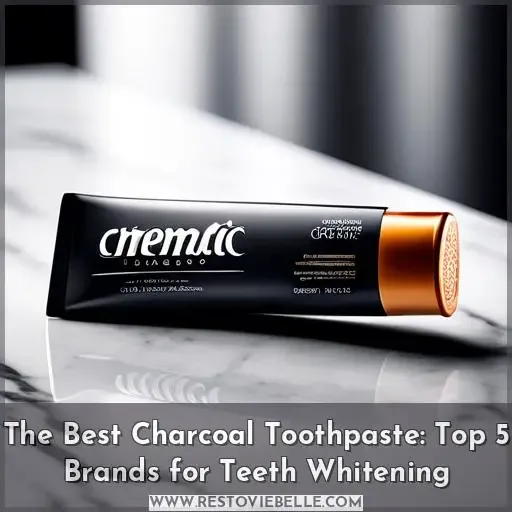
When selecting the optimal charcoal toothpaste, it’s crucial to evaluate its abrasiveness level to prevent enamel damage.
Explore products with a minimal abrasiveness index and advantageous components such as fluoride.
While charcoal effectively removes superficial stains for brighter teeth, its long-term effects remain under investigation.
The ADA recommends prudence due to uncertainties surrounding enamel erosion.
Notable recommendations include Activated Charcoal Teeth Whitening Toothpaste, Cali White Natural Activated Charcoal Toothpaste, and Crest Charcoal 3D White.
For an informed choice, it’s prudent to further investigate the composition, cleaning mechanism, and safety considerations.
Table Of Contents
- Key Takeaways
- Understanding Charcoal Toothpaste
- Charcoal Toothpaste Whitening Ability
- Evaluating Toothpaste Effectiveness
- Safety Considerations for Charcoal Toothpaste
- Benefits of Using Charcoal Toothpaste
- Choosing the Right Charcoal Toothpaste
- Top 5 Best Charcoal Toothpastes
- Unique Features of Charcoal Toothpaste
- Addressing Common Concerns
- Usage Guidelines for Charcoal Toothpaste
- Frequently Asked Questions (FAQs)
- Conclusion
Key Takeaways
- Charcoal toothpaste is made from activated charcoal, which has small pores that trap chemicals and deposits, acting like a magnet that attracts bacteria and stains.
- The cleaning mechanism of charcoal toothpaste is based on its abrasive nature, which acts as a scrub, potentially absorbing surface-level stains.
- The American Dental Association recommends using toothpaste with a low relative dentin abrasivity (RDA) to prevent enamel damage.
- Charcoal toothpaste is often marketed for its whitening ability, but it can’t improve deep intrinsic stains. Long-term use with improper technique can strip enamel and expose dentin, making teeth appear more yellow.
Understanding Charcoal Toothpaste
Curious about the composition of charcoal toothpaste? It’s crafted from activated charcoal, a porous material that can capture chemicals and deposits. While its abrasive nature functions as a scrub, it’s crucial to consider the toothpaste’s relative dentin abrasivity (RDA) to prevent damage to your tooth enamel.
Nature and Composition
Charcoal toothpaste is a popular dental product that has been gaining attention for its potential benefits. It’s made from activated charcoal, which is produced by heating charcoal in the presence of a gas. This process develops small pores that trap chemicals and deposits, acting like a magnet that attracts bacteria and stains. Charcoal toothpaste is often compared to a magnet that attracts bacteria and stains, but its function goes beyond just attracting particles. It also has a natural detoxifying effect, which can help neutralize bad breath without the need for additives or flavors.
The cleaning mechanism of charcoal toothpaste is based on its abrasive nature, which acts as a scrub, potentially absorbing surface-level stains. However, higher abrasivity doesn’t necessarily indicate better dental health. The American Dental Association uses the Relative Dentin Abrasivity (RDA) scale to measure toothpaste safety and efficacy, with a recommended value of 250 or less. Charcoal toothpaste with a low RDA can be used with proper brushing technique, ensuring that it doesn’t damage the enamel or cause other issues.
Charcoal toothpaste is often marketed for its whitening ability, which is based on its ability to absorb staining molecules. It can remove surface stains temporarily, but it can’t improve deep intrinsic stains. Long-term use with improper technique can strip enamel and expose dentin, making teeth appear more yellow. Consequently, caution is advised for long-term use, and it’s recommended to use charcoal toothpaste sparingly and with proper brushing technique to avoid enamel erosion.
Cleaning Mechanism and Abrasivity
Charcoal toothpaste is a popular choice over traditional toothpaste, but it’s important to understand how it cleans and its abrasiveness to keep your teeth healthy. Charcoal toothpaste is made from activated charcoal, which forms tiny holes that trap chemicals and deposits. Its gritty nature can act as a scrub, potentially removing surface-level stains. However, the level of abrasiveness doesn’t always mean better dental health. The American Dental Association (ADA) uses the Relative Dentin Abrasivity (RDA) scale to measure toothpaste safety and effectiveness. A low RDA charcoal toothpaste can be used with proper brushing technique.
When choosing charcoal toothpaste, consider the abrasiveness index to avoid enamel damage. Look for toothpastes with a low to medium abrasiveness index. Additionally, beneficial ingredients like fluoride or antibacterial agents can enhance the toothpaste’s effectiveness. Consider individual needs and consult a dental professional before use. Charcoal toothpaste isn’t recommended for frequent use due to potential enamel erosion.
Some of the best charcoal toothpastes include hello Activated Charcoal Toothpaste, Cali White Activated Charcoal & Organic Coconut Oil Whitening Toothpaste, Crest Charcoal 3D White Toothpaste, and Colgate Charcoal Teeth Whitening Toothpaste. These toothpastes offer a balance of abrasiveness and beneficial ingredients to promote dental health.
Charcoal Toothpaste Whitening Ability
Charcoal toothpaste can effectively remove surface stains on your teeth, but its capabilities are limited in terms of addressing deep intrinsic stains. While charcoal may temporarily enhance the brightness of your teeth, you should exercise caution regarding its long-term use as it has the potential to erode tooth enamel if not employed judiciously.
Surface Stain Removal
Charcoal toothpaste can remove surface stains from teeth, contributing to whiter teeth. However, its long-term effects on enamel safety and natural detoxification are still under investigation. To maximize the benefits of charcoal toothpaste, consider these tips:
- Choose a toothpaste with low to medium abrasiveness index to avoid damaging enamel.
- Incorporate beneficial ingredients like fluoride, coconut oil, and xylitol for better dental health.
- Use charcoal toothpaste with proper brushing technique to minimize potential risks.
- Consult your dentist before using charcoal toothpaste, especially if you’re pregnant, breastfeeding, or taking oral medications.
Limitations on Deep Stains
Regarding charcoal toothpaste, it’s crucial to comprehend its shortcomings. While it can eliminate surface discolorations from drinks, its impact on ingrained stains is diminished. Excessive use may result in enamel damage and increased sensitivity.
Abrasive components can jeopardize the health of your teeth if not employed appropriately. Continually evaluate the effectiveness and safety of the toothpaste, and select all-natural options that prioritize the well-being of your enamel.
Evaluating Toothpaste Effectiveness
Are you curious about the scientific evidence behind charcoal toothpaste? The American Dental Association has weighed in on its effectiveness, so let’s explore what the experts say.
Scientific Evidence
Regarding charcoal toothpaste, you may be speculating if it’s merely superficial or if there’s genuine scientific backing behind its whitening assertions. Let’s delve into the scientific evidence:
- Research is inconclusive, with some indicating mild whitening effects, but don’t anticipate your teeth to outshine passersby.
- The abrasiveness rating, or RDA, is essential for enamel protection; excessively high, and you may be eroding more than just unpleasant breath.
- Enduring implications on dental well-being are still uncertain, with further investigation necessary to unravel the obscurity.
- Although cavity prevention isn’t its forte, it could provide a modest enhancement to oral hygiene.
- Bear in mind, a radiant smile stems from healthy teeth, not just a fleeting glimmer.
ADA Recommendations
The American Dental Association (ADA) provides guidelines for toothpaste safety and efficacy, including the use of the Relative Dentin Abrasivity (RDA) scale.
While charcoal toothpaste can be effective in removing surface stains, its long-term use without fluoride can lead to enamel erosion and sensitivity**. Toothpastes containing green tea extract, gentle abrasives like coconut powder, and proper brushing technique can help mitigate these risks.
The ADA advises against using charcoal toothpaste due to its potential for enamel damage and lack of fluoride.
Safety Considerations for Charcoal Toothpaste
You’ll want to be aware of the safety considerations when using charcoal toothpaste. More research is needed to fully understand the long-term effects, and certain groups like pregnant women should exercise caution.
Long-Term Effects
Long-term charcoal toothpaste use raises concerns about enamel erosion and potential health risks. While research is limited, the ADA advises against charcoal-based toothpaste due to these uncertainties. It’s paramount to take into account individual needs and consult a dental professional before using charcoal toothpaste.
Opt for low to medium abrasiveness and beneficial ingredients like fluoride. Remember, charcoal toothpaste isn’t recommended for frequent use.
Special Populations Caution
Charcoal toothpaste safety is paramount for all, but specific groups necessitate heightened vigilance. Expectant and lactating individuals should refrain from using charcoal toothpaste owing to potential hazards. Those receiving oral contraceptives or other medications should seek counsel from their dentist prior to utilization. The long-term consequences of charcoal toothpaste aren’t fully elucidated, and overzealous brushing may result in enamel degradation.
Benefits of Using Charcoal Toothpaste
Charcoal toothpaste can help reduce plaque buildup and promote natural detoxification in your mouth. Its ability to absorb bacteria, stains, and tartar makes it an attractive option for improving your oral hygiene.
Plaque Reduction
Charcoal toothpaste can help remove surface stains on your teeth, thanks to its mild abrasiveness and ability to absorb surface stains. It may also improve bad breath by reducing odor-causing bacteria.
However, it isn’t recommended for everyday use due to its abrasiveness, which can wear down tooth enamel, making teeth appear more yellow and potentially cause sensitivity. Additionally, most charcoal toothpaste brands don’t contain fluoride, which is essential for preventing cavities and tooth decay.
It’s important to use charcoal toothpaste with caution and not overuse it, as excessive brushing can lead to enamel abrasion.
Natural Detoxification
Regarding teeth whitening, charcoal toothpaste acts as a natural purifier for your oral cavity. It’s a refreshing antidote to halitosis, targeting the hidden causes of those unpleasant odors.
However, avoid excessive use; similar to a beach lacking shade, overindulgence can result in enamel thinning and gum soreness.
Therefore, employ it judiciously to maintain the brilliance of your pearly whites without transforming your smile into a gritty, sensitive coastal zone.
Choosing the Right Charcoal Toothpaste
When choosing a charcoal toothpaste, look for one with a low abrasiveness index to avoid damaging your enamel. Additionally, opt for a toothpaste that contains beneficial ingredients like fluoride to strengthen your teeth and xylitol to prevent bacteria growth.
Abrasiveness Index
Essential to select the proper charcoal toothpaste is its abrasiveness level. High abrasiveness may not necessarily equate to enhanced dental health.
The American Dental Association (ADA) employs the Relative Dentin Abrasivity (RDA) scale to evaluate toothpaste safety and effectiveness. A low or moderate RDA is suggested to protect against enamel damage.
Always evaluate your oral care needs and consult a dentist prior to use. Appropriate brushing technique is critical for toothpaste effectiveness and enamel protection.
Beneficial Ingredients
Charcoal toothpaste is a popular alternative for those seeking a more natural approach to oral care. It’s made from activated charcoal, which is obtained from natural sources like coconut shells or bamboo and undergoes a process of activation to increase its surface area and adsorption capacity. This makes it effective at removing surface stains from teeth, providing a brighter smile.
Charcoal toothpaste also contains other beneficial ingredients, such as bentonite clay, which aids in detoxification, and baking soda, which is a mild abrasive that helps remove plaque and stains from the teeth. Essential oils like peppermint or tea tree oil are often added for their natural antimicrobial properties, which help combat bacteria responsible for bad breath. Coconut oil is another common ingredient, offering antimicrobial and anti-inflammatory properties that contribute to improved oral health.
Hydrogen peroxide and xylitol may also be included for their teeth whitening and tooth decay prevention properties, respectively. When choosing a charcoal toothpaste, consider the abrasiveness index to avoid damaging tooth enamel, and look for additional beneficial ingredients like fluoride or antibacterial agents. Consult a dental professional before use, especially for pregnant or breastfeeding individuals, those taking oral contraceptives or other medications, and for those with sensitive teeth or gums.
Top 5 Best Charcoal Toothpastes
If you’re seeking the best charcoal toothpastes to whiten your teeth, consider the top 5 options: Activated Charcoal Teeth Whitening Toothpaste, Cali White Natural Activated Charcoal Toothpaste, Remineralizing Activated Charcoal Toothpaste Travel Size, Hyperbiotics Activated Charcoal Toothpaste, and Crest Charcoal 3D White Toothpaste Pack. Each of these charcoal toothpastes has unique features that may suit different needs and preferences.
1. Activated Charcoal Teeth Whitening Toothpaste
Delving into the realm of teeth whitening, let’s explore Activated Charcoal Teeth Whitening Toothpaste. This toothpaste transcends the ordinary; it acts as a beacon for discoloration and malodors, bestowing upon your smile not only a brighter hue but also a renewed freshness.
Composed of natural elements, such as eco-conscious bamboo charcoal, it offers a guiltless path to an illuminated visage. Void of abrasive chemicals or artificial contaminants, it embodies pure, plaque-combating prowess encased in a vegan, compassionate vessel.
Envision your teeth indulging in a restorative retreat, where activated charcoal becomes the purveyor of detoxification. Moreover, it manifests an affinity for the planet, mirroring its benevolence towards your teeth. Thus, brush with the assurance that you’re traversing the path to a radiant smile, without sacrificing your principles or the well-being of our shared environment.
Best For: Individuals seeking a natural, eco-friendly way to brighten their teeth and freshen their breath.
- Removes surface stains for a whiter smile
- Fluoride-free, peroxide-free, and SLS-free formula
- Vegan and cruelty-free
- May stain counters and sinks
- Brush may leave black drip marks
- Toothpaste is black in color
2. Cali White Natural Activated Charcoal Toothpaste
Cali White Natural Activated Charcoal Toothpaste is a popular pick for those seeking a natural, chemical-free toothpaste that offers whitening benefits. The toothpaste is infused with organic coconut oil and baking soda, which work together to bind to stains and eliminate plaque, providing a deep clean. It also contains natural ingredients like Diatomaceous Earth, Tea Tree Oil, Coconut Oil, Xylitol, and Peppermint Oil, which contribute to its whitening and detoxifying properties.
Cali White Activated Charcoal Toothpaste has been clinically proven to whiten teeth up to 7 shades whiter, making it an effective option for those looking to improve the appearance of their smile. However, it’s crucial to be aware that the whitening effect may take some time to manifest, as some users have reported that it took a while to see noticeable whitening effects.
The toothpaste is vegan, fluoride-free, and cruelty-free, making it a suitable choice for those with specific dietary or ethical preferences. Despite its popularity, there have been concerns raised about the safety of charcoal toothpaste, with a class action lawsuit alleging that Crew International, the makers of Cali White, misled consumers about the safety and effectiveness of their charcoal toothpaste products.
Best For: Those seeking a chemical-free, vegan, and cruelty-free toothpaste with whitening benefits.
- Organic coconut oil and baking soda bind to stains and eliminate plaque
- Diatomaceous Earth, Tea Tree Oil, Coconut Oil, Xylitol, and Peppermint Oil contribute to whitening and detoxifying properties
- Fluoride-free, vegan, and cruelty-free
- May cause enamel breakdown with long-term use
- Can be messy to use
- May not be effective for all users
3. Remineralizing Activated Charcoal Toothpaste Travel Size
The Remineralizing Activated Charcoal Toothpaste Travel Size is a well-liked option for those desiring a natural, enamel-safe toothpaste. This toothpaste is designed with activated charcoal, which is well-known for its detoxifying properties and ability to remove surface stains. It also includes calcium and magnesium, which help fortify teeth.
When employing charcoal toothpaste, it’s vital to be gentle and avoid forceful brushing. Instead, brush in a circular motion and rinse thoroughly. It’s also advisable to use less than the suggested 2-3 times a week to prevent enamel erosion.
The Remineralizing Activated Charcoal Toothpaste Travel Size is free of fluoride, making it appropriate for those who opt for fluoride-free toothpastes. However, it’s significant to emphasize that fluoride is vital for remineralizing teeth and preventing tooth decay.
Best For: Those seeking a natural, enamel-safe toothpaste that detoxifies and removes stains.
- Contains activated charcoal for detoxification and stain removal.
- Includes calcium and magnesium to strengthen teeth.
- Free of fluoride.
- May cause sensitivity in some.
- Can be difficult to get out of the tube.
- Overpriced.
4. Hyperbiotics Activated Charcoal Toothpaste
Hyperbiotics Activated Charcoal Probiotic Toothpaste is a popular selection for those seeking a toothpaste that fosters oral well-being and brighter teeth. This toothpaste is distinctive in that it contains a Focused Probiotic Strain to aid in supporting oral health and whitening teeth. It’s devoid of fluoride, preservatives, foaming agents, and artificial colors and flavors, rendering it a natural and delicate choice for everyday use.
The toothpaste is formulated with a blend of elements that collaborate to support oral health. These encompass activated charcoal, which facilitates the removal of stains and sustains healthy teeth and gums; xylitol, which fosters tooth remineralization; and baking soda, which sustains a sound pH in the mouth. Moreover, it comprises a probiotic strain, Lactobacillus paracasei, which aids in repopulating the oral microbiome, promoting invigorating breath and a salubrious oral milieu.
Hyperbiotics Activated Charcoal Probiotic Toothpaste is befitting for the entire family and can be employed daily for peerless oral well-being. It’s vegan, gluten-free, non-GMO, and fabricated in a GMP certified facility, assuring the loftiest quality and safety standards.
Best For: Individuals seeking a natural and gentle toothpaste that promotes oral health and brighter teeth.
- Contains a Focused Probiotic Strain to support oral health
- Formulated with activated charcoal, xylitol, and baking soda to support healthy teeth and gums
- Free of fluoride, preservatives, foaming agents, and artificial colors and flavors
- May not be suitable for those with naturally weak enamel
- Dentist recommended using fluoride toothpaste in the evening to supplement
- More expensive than traditional toothpaste
5. Crest Charcoal 3D White Toothpaste Pack
Crest 3D White Charcoal Toothpaste is a popular option for those seeking to whiten their teeth with a charcoal-based toothpaste. This toothpaste is composed with charcoal powder, which assists in eliminating surface stains and illuminating teeth. It also incorporates fluoride, which is crucial for combating cavities and reinforcing tooth enamel.
The toothpaste is obtainable in various sizes, comprising a pack of three 4.1 oz tubes, and it’s advised for daily use. Customers have commended the toothpaste for its effectiveness in whitening teeth, leaving a minty fresh sensation, and removing stains efficiently. Nonetheless, some users have observed that the charcoal particles can be untidy when brushing.
It is essential to acknowledge that although charcoal toothpaste can aid in removing surface stains, it may not be as effectual at whitening profound intrinsic stains. Furthermore, immoderate use of charcoal toothpaste can potentially erode enamel and expose dentin, rendering teeth more yellow. Consequently, it’s prudent to utilize charcoal toothpaste cautiously and not to overindulge in its use.
Best For: Individuals seeking to whiten their teeth with a charcoal-based toothpaste.
- Removes surface stains
- Contains fluoride to fight cavities
- Leaves a minty fresh sensation
- Charcoal particles can be messy
- May not be effective on intrinsic stains
- Excessive use can erode enamel
Unique Features of Charcoal Toothpaste
From trendy pill-form tooth tabs to enticing flavors like Coca-Cola, charcoal toothpastes offer unique features to stand out from the crowd. Whether you prefer the convenience of tablets or the invigorating taste of charcoal-infused toothpaste, there’s a variety of options to suit your personal preferences.
Form Variations
Charcoal toothpaste is available in various formats to meet diverse preferences and requirements. The most prevalent format is paste, which has a similar texture to conventional toothpaste and can be applied using a toothbrush in gentle circular motions for two minutes before rinsing. Another choice is powder, which is packaged in a jar and necessitates the use of a wet toothbrush for application. Charcoal powder might’ve a gritty texture and be more untidy than other alternatives. Additionally, tablets are available for those who prefer a more unusual experience. These tablets can be bitten into and dissolved in the mouth before being brushed with a damp toothbrush.
When selecting a charcoal toothpaste, consider the format that aligns with your preferences and enables proper application and cleaning. Bear in mind that different formats may necessitate slightly different applications, so consistently adhere to the manufacturer’s instructions for best outcomes.
Flavor Options
Charcoal toothpaste comes in a variety of flavors, including mint, berry, and coconut. These unique tastes cater to different taste preferences and provide an invigorating brushing experience.
Some toothpastes even offer unusual flavors like charcoal mint or coconut charcoal to add a twist to the traditional toothpaste experience.
For those who prefer a more natural taste, there are also charcoal toothpastes that are free from artificial flavors and sweeteners.
Addressing Common Concerns
You may be concerned about the impact of charcoal toothpaste on your tooth enamel. While some charcoal toothpastes can be abrasive, choosing one with a low Relative Dentin Abrasivity (RDA) score can help prevent enamel damage when used properly. Additionally, many charcoal toothpastes now include fluoride, which helps strengthen and protect your teeth.
Enamel Safety
Enamel erosion is a concern when using charcoal toothpaste. The abrasive nature of charcoal can contribute to enamel damage, especially if the toothpaste is used improperly or excessively.
Charcoal toothpaste can increase the risk of cavities and tooth decay, particularly for those with thin enamel. It’s crucial to choose a charcoal toothpaste with a low to medium abrasiveness index to minimize the risk of enamel erosion.
Additionally, it’s prudent to consult with a dental professional before using charcoal toothpaste, especially if you have specific dental concerns or are taking oral medications.
Fluoride Content
Fluoride content is an important consideration when choosing charcoal toothpaste. While some charcoal toothpaste brands do use fluoride, not all of them use it effectively. To reap the benefits of fluoride, the concentration of fluoride in the toothpaste must be at least 1000 parts per million (ppm), with commercial brands often aiming for between 1350 ppm and 1450 ppm in each product. Fluoride is approved and recommended by dentists to use within your oral hygiene routine. Although fluoride can’t reverse cavity damage to teeth, it can act as a preventative measure and slow the development of cavities. The more regularly your teeth are exposed to fluoride, the greater the cavity prevention.
However, excessive fluoride ingestion during childhood can potentially contribute to enamel defects that increase sensitivity risk. Careful monitoring of fluoride intake from water, dental products, and foods can help avoid overexposure while teeth are still developing. If you have fluorosis-related sensitivity, work with your dentist on preventive therapies, desensitizing toothpastes, and restorations to manage symptoms.
Usage Guidelines for Charcoal Toothpaste
When using charcoal toothpaste, it’s best to limit its application to a few times per week. Be sure to brush gently for the full two minutes to avoid damaging your enamel.
Frequency of Use
Regarding charcoal toothpaste, frequency is crucial. Here are some pointers to keep in mind:
- Staining frequency: Use charcoal toothpaste 2-3 times per week to remove surface stains without excessive use.
- Sensitivity concerns: If you experience sensitivity or gum irritation, decrease the frequency of use.
- Enamel erosion: Be aware that excessive use can lead to enamel erosion, so use charcoal toothpaste cautiously.
- Whitening duration: Remember that the whitening effects are temporary, so don’t expect long-term results from daily use.
Proper Brushing Technique
Proper brushing technique is essential when using charcoal toothpaste to secure the most beneficial results and prevent potential harm to your teeth. Here are some guidelines to adhere to:
- Pressure: Employ gentle pressure when brushing with charcoal toothpaste. Exerting excessive pressure can result in enamel erosion, which can weaken your teeth gradually.
- Time: Brush for the recommended 2 minutes, twice daily. Brushing for extended periods can increase the likelihood of enamel damage.
- Angle: Hold your toothbrush at a 45-degree angle to your gums. This enables the toothpaste to effectively cleanse the gum line and eliminate plaque without damaging the gums.
- Coverage: Brush all surfaces of your teeth, including the external surfaces, internal surfaces, and chewing surfaces. Remember to brush your tongue and the roof and floor of your mouth to remove bacteria and freshen your breath.
- Force: Refrain from applying excessive force when brushing. Charcoal toothpaste is abrasive, and using excessive force can lead to enamel damage.
Frequently Asked Questions (FAQs)
What is the difference between charcoal toothpaste and regular toothpaste?
As the adage goes, different strokes for different folks. Charcoal toothpaste uses activated charcoal to absorb stains, while regular toothpaste relies on abrasives and chemicals to clean teeth. The main difference boils down to the key ingredients and their modes of action.
How does charcoal toothpaste work to whiten teeth?
Charcoal toothpaste’s tiny pores trap and absorb surface stains like a magnet, leaving your teeth looking brighter. It’s like a mini vacuum cleaner for stain-causing culprits lurking on your tooth enamel.
Is charcoal toothpaste safe for children?
You’d be wise to avoid charcoal toothpaste for kids—the abrasiveness could damage their delicate tooth enamel. Stick with child-friendly, fluoridated pastes until they’re old enough for that added scrub. Their smile’s longevity is what matters most!
Can charcoal toothpaste damage tooth enamel?
Charcoal toothpaste could damage your pearly whites if you’re not careful. Its abrasive nature might wear down that precious enamel over time…
What are the benefits of using charcoal toothpaste?
Charcoal toothpaste can help whiten your smile by absorbing surface stains – think of it as a magnet attracting those pesky coffee and wine deposits. But don’t expect miracles; it’s a gentle, natural solution.
Conclusion
Ultimately, selecting the best charcoal toothpaste necessitates assessing abrasiveness levels.
It also necessitates considering advantageous ingredients such as fluoride.
Additionally, potential long-term consequences should be considered.
While charcoal effectively eradicates surface stains, exercising discretion is prudent.
Consulting dental professionals is also prudent.
By meticulously considering factors like scientific evidence, safety concerns, and distinctive characteristics, you can make an informed choice.
This informed choice will be on the most effective charcoal toothpaste for your teeth whitening requirements.
- toolsofmen.com
- primandprep.com
- dentalcarereport.com

